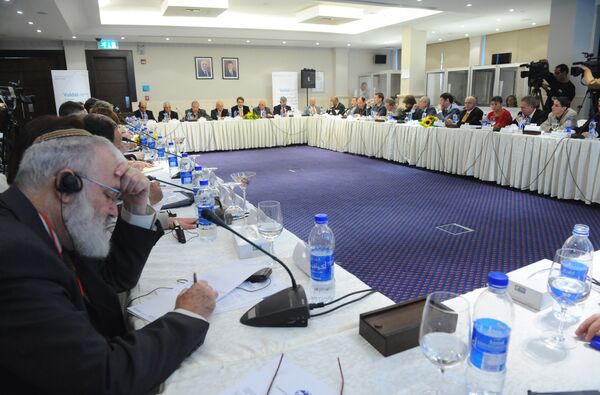The deadlock and lack of serious progress in the Middle East settlement could provoke a further crisis and spark violence in the region, experts have warned.
Experts were speaking at an international conference called "Middle East 2020: Is a Comprehensive Settlement Possible?" in Jordan on Monday. They addressed the Iranian nuclear problem and threats voiced by Iran and Israel.
Stagnation is dangerous
Former Russian prime minister Yevgeny Primakov, who opened the forum, warned that the current status quo in the Middle East would not last long.
"It is difficult to rule out the possibility of a new Intifada with a focus on terrorist attacks. This would be deplorable and against the interests of all states, including Russia. However, this scenario is possible, if the peace process is frozen," Primakov said.
Mideast crisis will deepen unless settlement is reached
The deadlock can be overcome if Israel freezes the construction of Jewish settlements in the occupied Palestinian territories and the U.S. clearly outlined its position by refusing to put the current Mideast situation on hold, the academician said.
Also, the Middle East negotiating quartet - the UN, the EU, Russia and the U.S. - must step up their mediatory efforts and offer a compromise framework settlement plan as the basis for Israeli-Palestinian negotiations, Primakov said.
A strike on Iranian nuclear facilities can have severe consequences
Former Palestinian Prime Minister Ahmed Qurei said it would be a blunder to resume negotiations with Israel on the Middle East settlement in the present context.
Qurei said the Palestinian-Israeli talks, if resumed amid the present situation, would be "just a guise for the implementation of the Israeli unilateral plan," aimed at maintaining the present situation in the region and the further occupation of Palestinian territories.
The issue of settlement construction in the West Bank, occupied by Israel since the 1967 Arab-Israeli War, has been the main obstacle to reviving peace talks with the Palestinians.
Under the internationally agreed roadmap for Middle East peace, Israel is obliged to freeze construction and remove unauthorized outposts built since 2001 from the Palestinian territories.
He said strained relations between Fatah, which rules the West Bank, and Hamas, which ousted Fatah from the Gaza Strip in the summer of 2007, hamper the situation.
Groping for a solution
Alexei Vasilyev, director of the Russian Academy of Sciences' African Studies Institute, urged the international community to enforce a collective solution to the problem.
He said the establishment of a united Arab-Jewish state, not two states for two peoples, could be such a solution.
World should enforce collective solution on Mideast
Gershon Baskin, the head of the Israeli-Palestinian Research and Information Center, also doubted the two conflicting parties would be able to find a solution through talks without a more active mediation on the part of the international community. He also said Palestinians could be full-fledged citizens of Israel, while Jewish settlers could live in the Palestinian National Authority.
Opinions differ
Yaacov Amidror, a retired general, a former officer for the Israeli Intelligence and currently a leading research associate at a number of Israeli think tanks, dismissed as "naive" the view that the status of the Arab-Israeli conflict was critical for regional stability.
Amidror said Israeli presence in Palestinian territories was a factor of stability and a security guarantee, which benefits not only the Israelis but also the Palestinians themselves.
Israel's withdrawal would worsen the situation
"If we leave the West Bank... it will end up under Hamas' control, and the world will not become more secure as a result," Amidror said.
Nuclear threat
Experts also discussed nuclear nonproliferation in the region, including Iran's nuclear dossier, on the first day of the forum.
Iranian plans: peaceful use of nuclear energy or nuclear threats?
Experts said Middle East countries should show political will to thwart nuclear proliferation in the region, referring to mutual threats from Iran and Israel.
The majority of forum participants warned against the threat of a potential Israeli attack on Iranian nuclear facilities that could lead to unpredictable consequences.
An opinion was voiced that Israel should reconcile itself with the availability of a nuclear rival in the region and switch from threats to nuclear deterrent policies.
Middle East nations should show political will
However, according to Efraim Inbar, the director of Israel's Begin-Sadat Center for Strategic Studies, a policy of nuclear restraint is not applicable to Iran as, he said, Iran's leaders threaten to wipe Israel off the map.
"A country threatening to destroy a UN member should not be allowed to possess nuclear weapons," he said.
Maher El Kurd, an economic advisor to the Palestinian leader, said it would be wrong to put the Iranian nuclear threat first when considering nuclear proliferation in the Middle East.
"While Iran poses a hypothetical nuclear threat, the real nuclear threat is coming from Israel, which already possesses nuclear weapons," the Palestinian politician said.
He stressed that apart from Israeli nuclear arms, the country's nuclear facilities which have been operating for more than 50 years now without any control from the International Atomic Energy Agency or the global community also posed a threat.
The conference where the experts spoke at kicked off on Sunday. It was organized by the Russian News & Information Agency RIA Novosti and the Russian Council for Foreign and Defense Policy within the framework of the Valdai International Discussion Club.
The forum involving prominent politicians, experts and political analysts from Russia, Arab states and Israel, as well as a number of European countries and the United States, will continue on Tuesday.
SUWEIMA (Jordan), December 22 (RIA Novosti)




